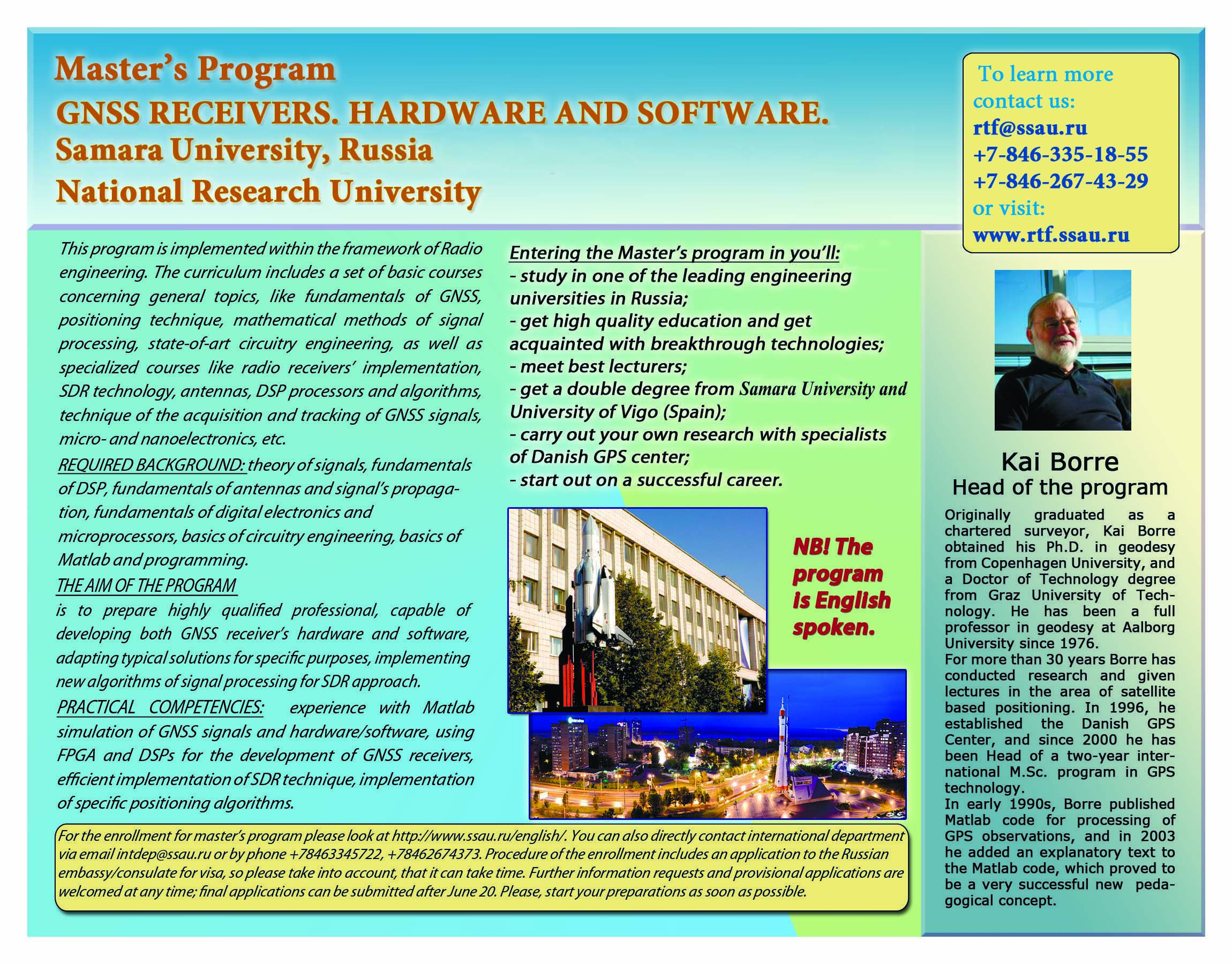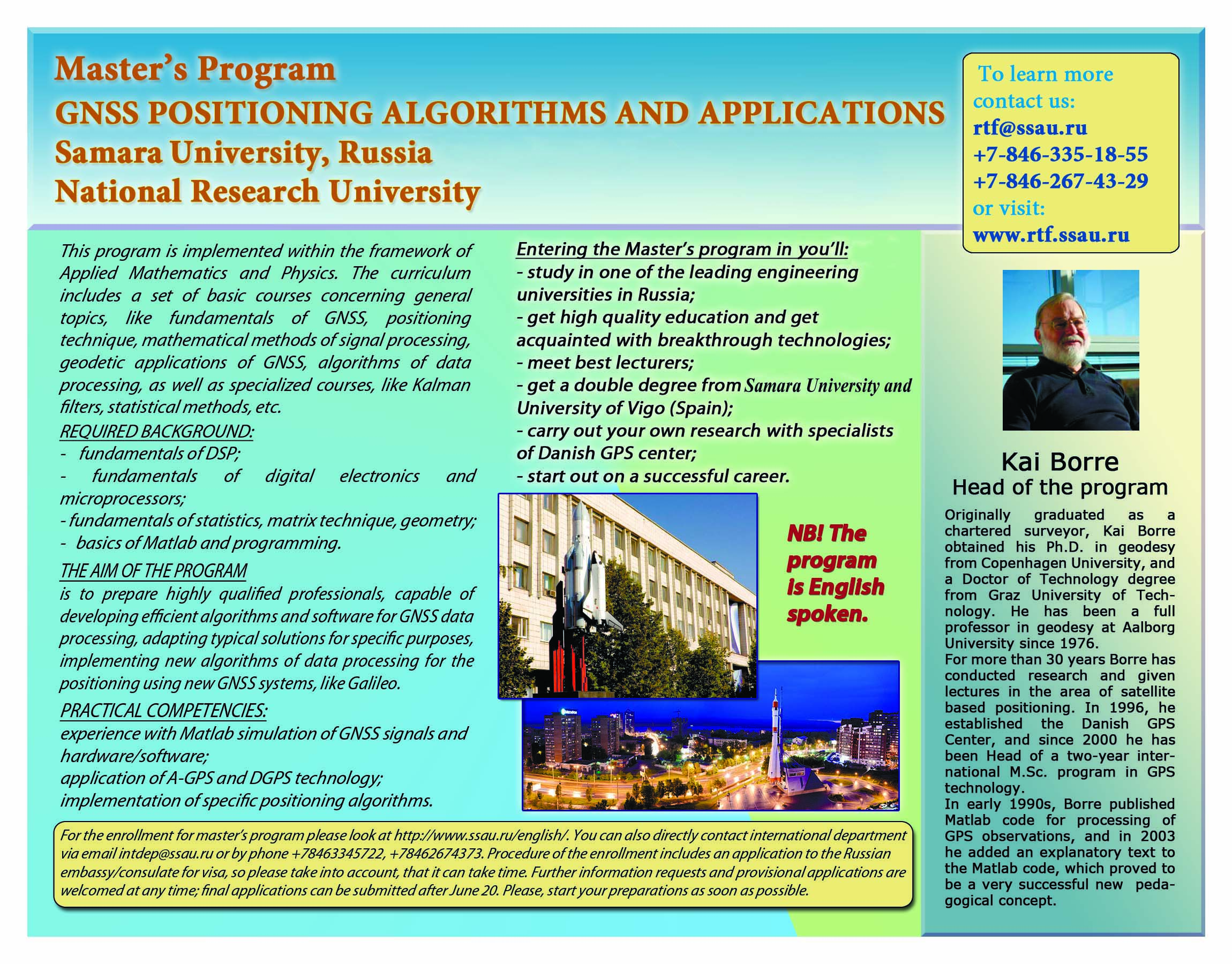Interuniversity Department of Space Research
Inter-university Department of Space Research is a major teaching and research unit of the University for undertaking
educational, scientific and methodical work on preparation of masters,
graduate students, doctoral students in the field of space research and space
innovative technologies; organization and implementation of joint Master
about programs and research with leading Russian universities and research
organizations as well as with foreign aerospace universities
promising basic and applied areas of astronautics.
Masters program, which provides training Chair:
- GNSS receivers. Hardware and software
This program is implemented within the framework of radio engineering. The curriculum includes a set of basic courses concerning general topics, like fundamentals of GNSS, positioning technique, mathematical methods of signal processing, state-of-art circuitry engineering, as well as specialized courses like radio receivers’ implementation, SDR technology, antennas, DSP processors and algorithms, technique of the acquisition and tracking of GNSS signals, micro- and nanoelectronics, etc.(continue..)
The aim of the program is to prepare highly qualified professional, capable to develop both GNSS receiver’s hardware and software, adapt typical solutions for specific purposes, to implement new algorithms of signal processing for SDR approach. Practical competencies: experience with Matlab simulation of GNSS signals and hardware/software, using FPGA and DSPs for the development of GNSS receivers, efficient implementation of SDR technique, implementation of specific positioning algorithms.
Professional skills
The graduates will obtain following professional skills:
- Development of state-of-art GNSS receivers;
- Knowledge of GNSS technologies for positioning tasks;
- Development of dedicated software for solving positioning tasks;
- Development of electronic hardware for various applications;
- Development of models and algorithms used in positioning.
The field of professional activity
The field of professional activity of graduates includes the areas of science, engineering and technologies related to research, design, and manufacturing of the electronic systems used in positioning applications.
Graduating from this program you are prepared for the following professional activities:
- Electronic engineering;
- Software engineering;
- Scientific research. The curriculum includes courses in electronic applications, software development, dedicated courses in GNSS technology. Many courses are delivered by lecturers, invited from the leading centres, involved in GNSS technologies. General supervision is performed by the expert in GNSS technologies professor Kai Borre who has comprehensive experience in GNSS technologies.
The curriculum includes courses in electronic applications, software development, dedicated courses in GNSS technology. Many courses are delivered by lecturers, invited from the leading centres, involved in GNSS technologies. General supervision is performed by the expert in GNSS technologies professor Kai Borre who has comprehensive experience in GNSS technologies.
Employment opportunities
After graduation you can work in research centres, universities, and enterprises involved in positioning applications.
- GNSS positioning algorithms and applications
This program is implemented within the framework of applied mathematics and physics. The curriculum includes a set of basic courses concerning general topics, like fundamentals of GNSS, positioning technique, mathematical methods of signal processing, geodetic applications of GNSS, algorithms of data processing, as well as specialized courses, like Kalman filters, statistical methods, etc. (continue..)
The aim of the program is to prepare highly qualified professional, capable to develop efficient algorithms and software for GNSS data processing, adapt typical solutions for specific purposes, implementation of new algorithms of data processing for the positioning using new GNSS systems, like Galileo. Practical competencies: experience with Matlab simulation of GNSS signals and hardware/software, application of A-GPS and DGPS technology, implementation of specific positioning algorithms
Professional skills
The graduates will obtain following professional skills:
- Using GNSS technologies for positioning tasks;
- Development of new techniques of positioning using GNSS;
- Development of the dedicated software for solving positioning tasks;
- Development of models and algorithms used in positioning.
The field of professional activity:
The field of professional activity of graduates includes the areas of science, engineering, and technologies related to research, design, and application of the positioning algorithms and software.
Having graduated from this program you are prepared for the following professional activities:
- Software engineering;
- System engineering;
- Scientific research. The curriculum includes courses in mathematical modelling, software development, and dedicated courses in GNSS technology. Many courses are delivered by lecturers, invited from the leading centres, involved in GNSS technologies. General supervision is performed by the expert in GNSS technologies professor Kai Borre, who has comprehensive experience in GNSS technologies.
The curriculum includes courses in mathematical modelling, software development, and dedicated courses in GNSS technology. Many courses are delivered by lecturers, invited from the leading centres, involved in GNSS technologies. General supervision is performed by the expert in GNSS technologies professor Kai Borre, who has comprehensive experience in GNSS technologies.
Employment opportunities
After graduation you can work in research centres, universities, and enterprises involved in positioning applications.
PhD Program:
Brief Description of the PhD Program
The curriculum includes the following advanced courses: Kalman filtering, Satellite orbits and other courses, useful for PhD students for writing a dissertation, participation in research projects, etc. The major part of the research work is focused on developing new algorithms for advanced GNSS applications.
Required background: Fundamentals of DSP, fundamentals of digital electronics and microprocessors, MATLAB programming, GNSS theory and applications.
The aim of the program is to prepare highly qualified scientists, capable to develop hardware and software for GNSS data processing, and perform research in the subject area.
Professional skills
The graduates will obtain the following professional skills:
- Using GNSS technologies for positioning tasks;
- Development of new techniques of positioning using GNSS;
- Performing research in the area of GNSS;
- Development of models and algorithms used in positioning.
Outcome (diploma or credits): PhD degree in GNSS technologies
Duration: 3 Years, 180 credits
Application Deadline: 15 September 2015
Tuition fee: 150000 RUR
Enrollment status: full-time
Duration: 3 years
Qualification: PhD Degree
Website of the Department: www.spaceresearch.ssau.ru/en
Head of the department:
Doctor of Technical Sciences, Professor
Belokonov Igor Vitalievich
E-mail: ibelokonov@mail.ru
